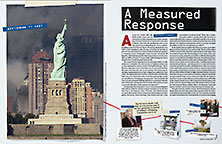 With the inauguration of Barack Obama, Associate Professor of Clinical Law Margaret Satterthwaite held hope that her influential scholarship and activism against extraordinary rendition would cease to be necessary. Since 9/11, she has written articles such as “Rendered Meaningless: Extraordinary Rendition and the Rule of Law” (2007) and a 2004 white paper, “Torture by Proxy: International and Domestic Law Applicable to ‘Extraordinary Renditions,’” that spell out the responsibility of the U.S. government to end the practice of transferring terrorism suspects to third countries known to use torture, as well as to investigate, prosecute, and punish those who utilize it.
With the inauguration of Barack Obama, Associate Professor of Clinical Law Margaret Satterthwaite held hope that her influential scholarship and activism against extraordinary rendition would cease to be necessary. Since 9/11, she has written articles such as “Rendered Meaningless: Extraordinary Rendition and the Rule of Law” (2007) and a 2004 white paper, “Torture by Proxy: International and Domestic Law Applicable to ‘Extraordinary Renditions,’” that spell out the responsibility of the U.S. government to end the practice of transferring terrorism suspects to third countries known to use torture, as well as to investigate, prosecute, and punish those who utilize it.
But Satterthwaite’s work continues. Just as the notorious Guantánamo Bay detention center remains open while the administration studies what to do with its more dangerous prisoners, the CIA retains the authority to conduct “ordinary” rendition, meaning that the U.S. may continue to snatch terrorism suspects around the globe and send them to third countries provided that it obtains assurances from the receiving countries that detainees won’t be tortured.
Satterthwaite, faculty director of the Center for Human Rights and Global Justice, is now analyzing what legal standards ought to apply to Obama’s “rendition lite.” She hopes her conclusions—which will appear in a forthcoming law review article—will help shape the report of an interagency task force Obama has charged with addressing the issue. “The work is intellectually harder, because the answers are less obvious” now that policies are less extreme, Satterthwaite says.
In Satterthwaite’s clinical human rights work, which allows NYU students to participate in cutting-edge litigation, she represents Mohamed Farag Ahmad Bashmilah, a Yemeni who was rendered and held in CIA “black sites” for more than 18 months before being released in his native country without having ever been formally charged with terrorism. In 2007, Bashmilah sued Jeppesen Dataplan in federal court, accusing the Boeing subsidiary of providing flight services for his allegedly illegal detention and questioning.
The Bush administration intervened in the ACLU-led case, arguing that the litigation should be dismissed because open court proceedings risked revealing sensitive state secrets. The trial court agreed with the government, and surprisingly, a Justice Department lawyer told the appellate court in February 2009 that the Obama administration would continue to argue the so-called state secrets doctrine and seek to stop the lawsuit.
Satterthwaite said, “It was literally just Bush redux—exactly the same legal arguments we saw the Bush administration present to the court.” She adds: “Our role in the case clearly isn’t over.”
—
